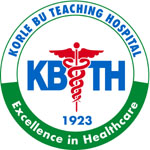Korle-Bu Teaching Hospital
| Korle-Bu Teaching Hospital | |
|---|---|
| Ministry of Health | |
 |
|
| Geography | |
| Location | Accra, Accra Metropolis District, Greater Accra Region, Ghana |
| Organisation | |
| Care system | Public - Ghana Health Service |
| Hospital type | Teaching |
| Affiliated university | University of Ghana Medical School |
| Services | |
| Emergency department | Yes |
| Beds | 1600 |
| History | |
| Founded | 9 October 1923 |
| Links | |
| Website | KBTH |
| Lists | Hospitals in Ghana |
The Korle-Bu Teaching Hospital is the premier health care facility in Ghana. It is the only tertiary hospital in the southern part of Ghana. It is a teaching hospital affiliated with the medical school of the University of Ghana. Three centres of excellence, the National Cardiothoracic Centre, the National Plastic and Reconstructive Surgery and the Radiotherapy Centres are all part of it.
Established on 9 October 1923, the Korle Bu Teaching Hospital has grown from an initial 200-bed capacity to 2,000. It is currently the third largest hospital in Africa and the leading national referral centre in Ghana.
Korle Bu, which means the valley of the Korle Lagoon, was established as a General Hospital to address the health needs of the indigenous people under Sir Gordon Guggisberg's administration, the then Governor of the Gold Coast.
Population growth and the proven efficacy of hospital-based treatment caused a rise in hospital attendance in Korle Bu. By 1953, demand for the hospital's services had escalated so high that the government was compelled to set up a task force to study the situation and make recommendations for the expansion of the hospital.
The government accepted and implemented the recommendations of the task force which resulted in the construction of new structures, such as the Maternity, Medical, Surgical and Child Health Blocks. This increased the hospital's bed capacity to 1,200.
Korle Bu gained teaching hospital status in 1962, when the University of Ghana Medical School (UGMS) was established for the training of medical doctors.
The UGMS and five other constituent schools are now subsumed under the College of Health Sciences to train an array of health professionals. All the institutions of the College however, undertake their clinical training and research in the Hospital.
At the moment, the Hospital has 2,000 beds and 17 clinical and diagnostic Departments/Units. It has an average daily attendance of 1,500 patients and about 250 patient admissions.
...
Wikipedia
